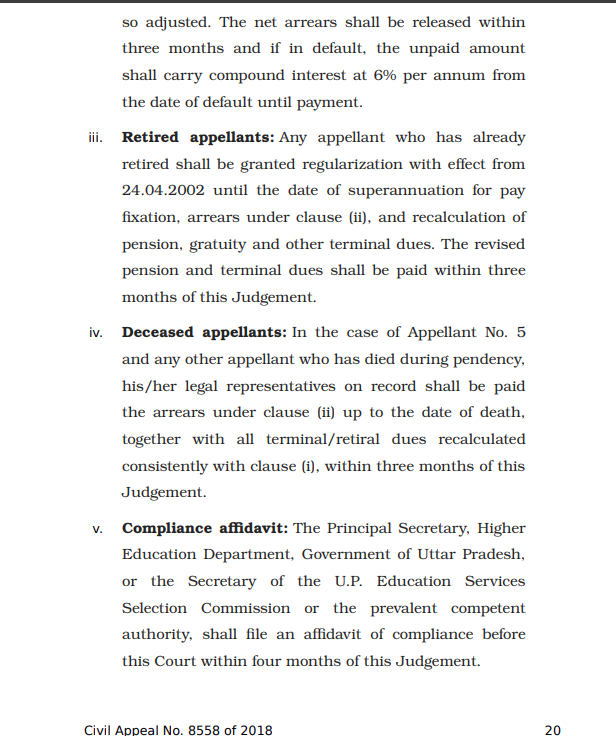Ad Hocism Meets Constitutional Duty: SC on Regularisation of Workers
- M.R Mishra

- Aug 19, 2025
- 4 min read
हिंदी अनुवाद नीचे है
The Supreme Court’s recent ruling in Dharam Singh & Ors. v. State of U.P. marks another significant step in the judiciary’s push against the prolonged exploitation of workers under the guise of “daily wagers” and “temporary” staff.
What's The Matter?
For decades, a group of Class-III and Class-IV employees engaged by the U.P. Higher Education Services Commission worked as peons, attendants, and drivers, performing perennial duties essential to the functioning of the institution.
Yet, the State repeatedly refused to sanction posts, citing financial constraints, leaving these workers trapped in precarious employment.
The Court cut through the layers of excuses and upheld a simple constitutional truth: where the work is permanent, the employment structure must reflect that permanence.
Both the Single Judge and Division Bench of the High Court had dismissed the workers’ claims, resting on the oft-invoked Umadevi precedent.
But as the Supreme Court carefully explained, this was not a case of backdoor entry or illegal appointments it was a challenge to the arbitrariness of the State’s refusal to create sanctioned posts, despite decades of reliance on the same employees to discharge regular duties.
The judgment goes further than just quashing the refusals of 1999 and 2003.
It directs the State and its successor body to regularize the appellants from 2002, create supernumerary posts, pay arrears with interest, and even recalculate pensions and retiral dues for retired or deceased employees.
In doing so, the Court insists that fairness, transparency, and dignity in employment are constitutional obligationsnot matters of administrative grace.
Significantly, it warns that outsourcing cannot be used as a shield to perpetuate precarious employment and evade long-term responsibility.
This decision reinforces the idea that the State, as a constitutional employer, carries a higher burden than private actors. Financial constraints may be real, but they cannot serve as a talisman to override equity and legality.
By framing detailed directions with timelines and compliance affidavits, the Court has sought to ensure that justice is not delayed by endless bureaucratic drift.
At its heart, the ruling is a strong reminder that prolonged ad hocism corrodes trust in public administration. The dignity of those who keep public offices running cannot be sacrificed at the altar of expediency.
In insisting on regularization, arrears, and accountability, the Supreme Court has reaffirmed that Articles 14, 16, and 21 demand more than rhetoric they demand concrete outcomes for workers who have given their lives to public service.

उच्चतम न्यायालय का हालिया फैसला, धरम सिंह एवं अन्य बनाम उत्तर प्रदेश राज्य (2025 INSC 998), "दैनिक वेतन भोगी" और "अस्थायी" कर्मचारियों के बहाने श्रमिकों के लंबे समय से चले आ रहे शोषण के खिलाफ न्यायपालिका के दबाव में एक और महत्वपूर्ण कदम है।
दशकों तक, उत्तर प्रदेश उच्च शिक्षा सेवा आयोग द्वारा नियोजित तृतीय और चतुर्थ श्रेणी के कर्मचारियों के एक समूह ने चपरासी, अटेंडेंट और ड्राइवर के रूप में काम किया, जो संस्थान के कामकाज के लिए आवश्यक स्थायी कर्तव्यों का निर्वहन करते रहे।
फिर भी, राज्य ने वित्तीय बाधाओं का हवाला देते हुए पदों को मंजूरी देने से बार-बार इनकार कर दिया, जिससे ये श्रमिक अनिश्चित रोजगार में फंसे रहे।
न्यायालय ने बहानों की परतों को काटते हुए एक साधारण संवैधानिक सच्चाई को कायम रखा: जहाँ काम स्थायी है, वहाँ रोजगार की संरचना भी उस स्थायित्व को प्रतिबिंबित करनी चाहिए।
उच्च न्यायालय के एकल पीठ और खंडपीठ दोनों ने ही अक्सर दोहराए जाने वाले उमादेवी मिसाल के आधार पर श्रमिकों के दावों को खारिज कर दिया था।
लेकिन जैसा कि सर्वोच्च न्यायालय ने सावधानीपूर्वक समझाया, यह अवैध नियुक्तियों का मामला नहीं था बल्कि यह दशकों तक नियमित कर्तव्यों का निर्वहन करने वाले एक ही कर्मचारियों पर निर्भर रहने के बावजूद, स्वीकृत पद सृजित करने से राज्य के इनकार की मनमानी की चुनौती थी।
यह निर्णय सिर्फ 1999 और 2003 के इनकार को रद्द करने से कहीं आगे जाता है। यह राज्य और उसके उत्तराधिकारी निकाय को निर्देश देता है कि वे अपीलकर्ताओं को 2002 से समायोजित करें, अधिसंख्य पद (supernumerary posts) सृजित करें, ब्याज सहित बकाया राशि का भुगतान करें, और सेवानिवृत्त या मृत कर्मचारियों के लिए पेंशन और सेवानिवृत्ति benefits की पुनर्गणना भी करें।
ऐसा करते हुए, न्यायालय इस बात पर जोर देता है कि रोजगार में निष्पक्षता, पारदर्शिता और गरिमा संवैधानिक दायित्व हैं प्रशासनिक दया का मामला नहीं।
महत्वपूर्ण रूप से, यह चेतावनी देता है कि आउटसोर्सिंग का उपयोग अनिश्चित रोजगार को बनाए रखने और दीर्घकालिक जिम्मेदारी से बचने के लिए एक ढाल के रूप में नहीं किया जा सकता है।
यह निर्णय इस विचार को मजबूत करता है कि राज्य, एक संवैधानिक नियोक्ता के रूप में, निजी कार्यकर्ताओं की तुलना में अधिक भार वहन करता है।
वित्तीय बाधाएं वास्तविक हो सकती हैं, लेकिन वे न्याय और वैधता को दरकिनार करने का ताबीज नहीं बन सकतीं। समयसीमा और अनुपालन हलफनामों के साथ विस्तृत निर्देश तैयार करके, न्यायालय ने यह सुनिश्चित करने का प्रयास किया है कि न्याय में अंतहीन नौकरशाही शिथिलता के कारण देरी न हो।
अपने मूल में, यह फैसला एक strong reminder है कि लंबे समय तक चलने वाला तदर्थवाद (ad hocism) लोक प्रशासन में विश्वास को खोखला कर देता है।
जो लोग सार्वजनिक कार्यालयों को चलाते हैं, उनकी गरिमा को (सुविधा) की बलि नहीं चढ़ाया जा सकता।
समायोजन, बकाया राशि और जवाबदेही पर जोर देकर, सर्वोच्च न्यायालय ने इस बात की पुष्टि की है कि अनुच्छेद 14, 16 और 21 केवल जुमलों से कहीं अधिक की मांग करते हैं वे उन श्रमिकों के लिए ठोस परिणामों की मांग करते हैं जिन्होंने अपना जीवन लोक सेवा के लिए दे दिया है।



Disclaimer: This blog is for informational and educational purposes only. It summarizes a Supreme Court judgment and should not be treated as legal advice. For guidance on specific legal issues, readers should consult a qualified professional.







Comments